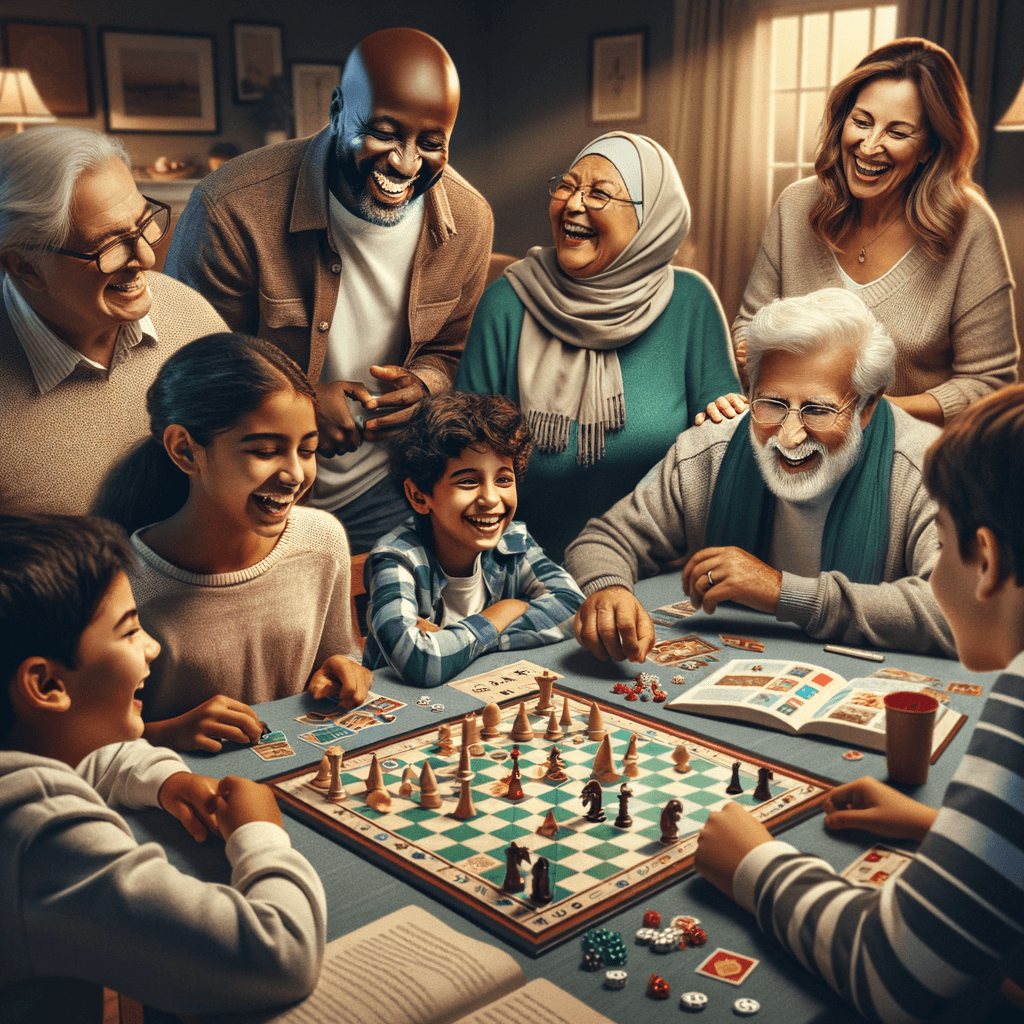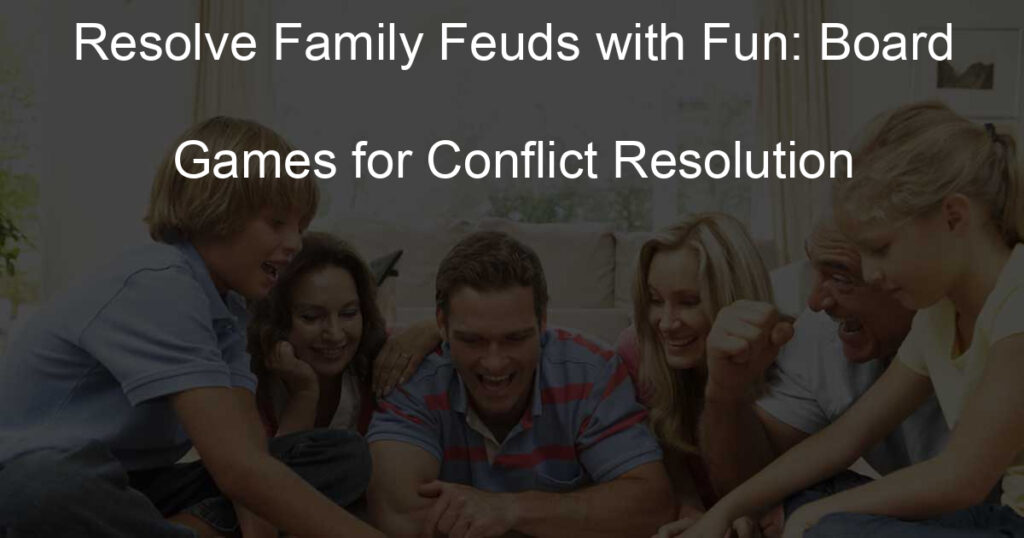Introduction: The Power of Family Board Games
Hey there, game lovers! Ever wondered why family board games hold such a special place in our hearts? Well, they’re not just about fun and laughter. They’re powerful tools that can positively impact family dynamics and even help with conflict resolution. Let’s dive in and explore this exciting world of board games!
-
- The impact of family board games on family dynamics
Family board games are more than just a way to pass the time. They’re a way to connect, communicate, and collaborate. According to a Wikipedia article, playing board games can strengthen family bonds, improve communication, and encourage teamwork. Plus, it’s a great way to learn about each other’s strengths and weaknesses, which can lead to a deeper understanding and appreciation of each family member.
-
- How board games can aid in conflict resolution
Did you know that board games can also be a tool for conflict resolution? It’s true! When family members play a game together, they learn to negotiate, compromise, and solve problems as a team. This can translate into real-world skills that can help resolve conflicts in a peaceful and constructive way. For example, a game might require players to negotiate for resources, teaching them the value of compromise and fair play. These lessons can be applied to real-life situations, helping families navigate conflicts more effectively.
So, are you ready to roll the dice and see the magic of family board games unfold? Stay tuned as we explore some top family therapy board games, board games for communication skills, and fun family game night ideas. We’ll also delve deeper into the therapeutic power of board games and other conflict resolution activities. Let’s play!
Understanding Conflict Resolution Games
Hey there, game lovers! Today, we’re going to dive into a special type of game that not only promises fun but also helps in resolving conflicts. Yes, you guessed it right! We’re talking about conflict resolution games. Let’s get started!
Defining Conflict Resolution Games
Before we go any further, let’s first understand what these games are all about.
- What are conflict resolution games?Conflict resolution games are interactive activities designed to teach individuals how to handle disputes effectively. They are not your usual board games. Instead, they are specially designed to help players understand each other’s perspectives and find solutions that work for everyone. Cool, isn’t it?
- The role of these games in resolving family conflictsNow, you might be wondering how these games can help in resolving family conflicts. Well, when families play these games together, they get a chance to express their feelings and thoughts in a safe and fun environment. These games encourage open communication, understanding, and cooperation among family members. This way, they can help in resolving conflicts and improving relationships. Pretty amazing, right?
So, next time you’re looking for a fun activity that can also help in improving your family relationships, consider playing a conflict resolution game. Stay tuned for more insights on this exciting topic!

Benefits of Conflict Resolution Games
Hey there, game lovers! Ever wondered how playing games can help you in real life? Well, conflict resolution games are not just fun to play, but they also come with a bunch of cool benefits. Let’s dive in and see what they are!
-
- Improving Communication Skills
First off, these games are a great way to boost your communication skills. They encourage everyone to express their thoughts and feelings. This helps you understand each other better. Isn’t that awesome? Plus, good communication is key to resolving any conflict. So, the more you play, the better you get at talking things out!
-
- Enhancing Family Bonding
Next up, conflict resolution games are perfect for family time. They bring everyone together and create a fun, relaxed environment. This helps strengthen your family bond. And guess what? A strong family bond can help you tackle any conflict that comes your way. So, why not make game night a family tradition?
-
- Teaching Conflict Resolution Strategies
Last but not least, these games teach you how to handle conflicts. They show you different strategies to resolve issues. You learn how to listen, understand, and find a solution that works for everyone. And the best part? You get to practice these skills in a safe, fun setting. So, the next time a conflict pops up, you’ll know exactly what to do!
So, there you have it! Conflict resolution games are not just about winning or losing. They’re about learning important life skills, strengthening your family bond, and having a blast while doing it. So, why not give them a try? You might be surprised at how much fun learning can be!
Top Family Therapy Board Games
Playing board games is not just about having fun. It’s also a great way to strengthen family bonds and resolve conflicts. Let’s take a look at some top family therapy board games that can help you achieve this.
Board Games for Family Bonding
These games are designed to bring families closer together. They encourage communication, cooperation, and understanding. So, let’s dive in!
- Game 1: The UngameThe Ungame is a unique board game that encourages open communication and sharing. Players take turns answering questions about their thoughts, feelings, and experiences. It’s a great way to get to know each other better and understand each other’s perspectives. Plus, it’s super fun!
Benefits: Enhances communication, encourages empathy, and strengthens family bonds.
- Game 2: Q’s Race to the TopQ’s Race to the Top is an educational board game that teaches children about emotions, manners, social skills, and creative thinking. Players help Q, the genius monkey, to reach the top of his treehouse by answering questions and performing fun physical activities. It’s a blast for kids and adults alike!
Benefits: Improves social skills, promotes emotional intelligence, and fosters family bonding.
So, why not give these games a try? They’re not just entertaining, but they can also bring your family closer together. And who knows? You might even learn something new about each other along the way!
Games for Resolving Family Conflicts
Let’s dive into two amazing games that can help resolve family conflicts. These games are not just fun, but they also teach us how to communicate better, understand each other’s perspectives, and work together as a team.
- Game 1: “Peaceful Kingdom”“Peaceful Kingdom” is a cooperative board game where players work together to achieve a common goal. Instead of competing against each other, family members must collaborate and strategize to win the game. This encourages open communication and mutual respect.
The benefits of “Peaceful Kingdom” are numerous. It promotes teamwork and cooperation, helps improve problem-solving skills, and fosters a sense of unity. Plus, it’s a great way to spend quality time together as a family!
- Game 2: “Sorry!”“Sorry!” is a classic board game that can teach families about conflict resolution in a fun and engaging way. The game involves moving your pawns around the board while also bumping others back to start. This can lead to playful conflicts that provide opportunities for family members to practice resolving disagreements in a safe environment.
Playing “Sorry!” can help families learn how to handle conflicts in a healthy way. It teaches patience, sportsmanship, and the importance of apologizing when you’ve made a mistake. Plus, it’s a fantastic game for family game nights!
Remember, the goal of these games isn’t just to win, but to learn and grow together as a family. So, why not try one of these games at your next family game night? You might be surprised at how much fun you have, and how much you learn about each other in the process!
Board Games for Communication Skills
Board games aren’t just for fun. They can also be a great way to improve communication skills. Let’s take a look at two games that can help you and your family communicate better.
-
- Game 1: Guess Who?
Guess Who? is a classic board game that requires players to ask questions and make deductions. The goal is to guess the other player’s character by asking yes or no questions. This game encourages clear communication and active listening.
Benefits: Guess Who? helps to develop critical thinking skills and promotes effective communication. It also encourages players to pay attention to details and to think before they speak.
-
- Game 2: Codenames
Codenames is a game of guessing which words in a set are related to a hint given by another player. Players must communicate effectively and think creatively to win. It’s a game that requires both verbal and non-verbal communication skills.
Benefits: Codenames enhances vocabulary, encourages team work, and improves both verbal and non-verbal communication skills. It also fosters strategic thinking and problem-solving skills.
So, next time you’re planning a family game night, consider adding Guess Who? and Codenames to the mix. Not only will you have a blast, but you’ll also be improving your communication skills. Happy gaming!
Family Game Night Ideas
Are you ready to have a blast with your family? Well, a family game night is a perfect way to do just that! But, how do you plan a successful game night? Don’t worry, we’ve got you covered. Here are some tips to help you out.
Planning a Successful Game Night
Planning a successful game night involves two main steps: Choosing the right games and setting the right atmosphere. Let’s dive into each of these steps.
-
- Choosing the right games
Choosing the right games is crucial for a successful game night. You want to pick games that everyone in the family can enjoy. Consider the age and interests of all family members. For example, if you have young kids, choose games that are easy to understand and play. If you have teenagers, you might want to go for games that are a bit more challenging. Remember, the goal is to have fun and spend quality time together.
-
- Setting the right atmosphere
Setting the right atmosphere is just as important as choosing the right games. Make sure the room is comfortable and well-lit. You can also add some fun decorations to make the night feel special. Don’t forget to prepare some snacks and drinks. After all, what’s a game night without some yummy treats? And most importantly, make sure everyone is in a good mood. A positive attitude can make any game more fun!
So, are you ready to plan your family game night? With the right games and the right atmosphere, you’re sure to have a night full of laughter and fun. So, let the games begin!
Case Study: A Successful Family Game Night
Let’s dive into a real-life example of a family who nailed their game night. This case study will give us some insights into how to make our own family game nights a success.
-
- Background of the Family
The Johnson family is a lively bunch of five. Mom, Dad, and their three kids aged 8, 10, and 12. They live in a bustling city but always make sure to spend quality time together. They decided to start a weekly family game night to strengthen their bond and have fun together.
-
- The Games They Played
The Johnsons played a mix of board games and card games. They started with the classic Monopoly to teach the kids about money management. Next, they moved on to Uno for some light-hearted fun. They ended the night with Jenga, a game of strategy and balance.
-
- The Outcome and Key Takeaways
The family game night was a huge success! The Johnsons had a blast and learned a lot from each other. The kids improved their strategic thinking and patience from Monopoly. Uno helped them understand the importance of taking turns and being fair. Jenga taught them the value of careful planning and precision. The family felt more connected and vowed to make game night a regular event.
So, what can we learn from the Johnsons? Family game night is not just about fun. It’s also about learning and growing together. Choose games that are enjoyable but also offer some kind of learning experience. And most importantly, make it a regular event to look forward to!
Conflict Resolution Activities Beyond Board Games
Hey there! So, we’ve talked a lot about how board games can help with conflict resolution. But guess what? There are other fun activities too that can help improve communication and resolve conflicts. Let’s dive into a couple of them, shall we?
-
Activity 1: Role-Playing
Role-playing is a super fun activity where you pretend to be someone else. It’s like acting in a play! But did you know it can also help solve conflicts? It’s true! When you step into someone else’s shoes, you can understand their feelings better. This can help you see things from their perspective and resolve any disagreements.
Benefits:
- Improves empathy: You learn to understand and share the feelings of others.
- Boosts communication skills: You learn to express your thoughts and feelings more clearly.
- Enhances problem-solving: You learn to think creatively and find solutions to conflicts.
-
Activity 2: Team Sports
Who doesn’t love a good game of soccer or basketball, right? But did you know that team sports can also help with conflict resolution? When you play a team sport, you have to work together with your teammates to win. This teaches you how to communicate effectively, cooperate with others, and resolve conflicts.
Benefits:
- Builds teamwork: You learn to work together with others towards a common goal.
- Improves communication: You learn to express your ideas and listen to others.
- Teaches sportsmanship: You learn to handle wins and losses gracefully, which can help in resolving conflicts.
So there you have it! Role-playing and team sports are two awesome activities that can help with conflict resolution. And the best part? They’re not just educational, they’re super fun too! So why not give them a try?
Therapeutic Board Games: A Deeper Dive
Ever wondered how a simple board game can help you feel better? Let’s take a closer look at therapeutic board games and their role in family therapy.
Understanding Therapeutic Board Games
Therapeutic board games are not your regular games. They are designed with a special purpose in mind. Let’s understand them better.
-
- What are therapeutic board games?
Therapeutic board games are unique games that are designed to help people express their feelings, learn about themselves, and improve their communication skills. These games are not just about winning or losing; they are about learning and growing. They can help people of all ages, especially kids, to deal with difficult emotions and situations in a safe and fun way. Wikipedia has more details on this.
-
- The role of these games in family therapy
Family therapy is all about improving communication and resolving conflicts. And that’s where therapeutic board games come in. These games can help family members to open up, share their feelings, and understand each other better. They can also help to reduce stress and improve the overall mood of the family. In a nutshell, therapeutic board games can turn a regular family game night into a healing and bonding experience.
So, the next time you plan a family game night, consider including a therapeutic board game. It’s not just about fun, it’s about healing and growing together as a family.
Examples of Therapeutic Board Games
- Game 1: The UngameThe Ungame is a unique board game that encourages open communication. The game doesn’t have winners or losers, so it’s all about sharing and understanding. Players take turns picking cards with questions. The questions can be about feelings, thoughts, or experiences. This helps everyone to hear and understand each other better.
Benefits: The Ungame helps improve communication skills. It also helps players to understand each other’s feelings and thoughts. This can make family relationships stronger. Plus, it’s a fun way to spend time together!
- Game 2: Feelings in a JarFeelings in a Jar is a game that helps players understand and express their feelings. The game includes a jar filled with cards. Each card has a different feeling written on it. Players take turns picking a card and then talking about a time when they felt that way.
Benefits: This game helps players to understand their feelings better. It also helps them to express their feelings in a safe and supportive environment. This can help to reduce stress and improve mental health. Plus, it’s a great way to learn about each other’s experiences and feelings.
Conclusion: The Power of Play in Conflict Resolution
As we wrap up, let’s take a moment to remember the magic of board games. They’re not just fun and games, they’re powerful tools for conflict resolution too!
- Recap of the benefits of board games for conflict resolution
Board games can teach us how to communicate better, understand different perspectives, and work together as a team. They can help us to practice patience, empathy, and strategic thinking. Plus, they can make tough conversations a little bit easier and a lot more fun. Board games are a great way to bring families together and resolve conflicts in a positive and playful way.
- Encouragement for families to try these strategies
So, why not give it a try? Next time you’re faced with a family conflict, pull out a board game. You might be surprised at how much you can learn from a simple game of Monopoly or Scrabble. Remember, the goal isn’t to win the game, but to win at communication and understanding. So, let’s roll the dice, take a chance, and see the power of play in action!
And remember, the most important thing is to have fun. Because when we’re having fun, we’re more open to learning and growing. So, let’s play on!



